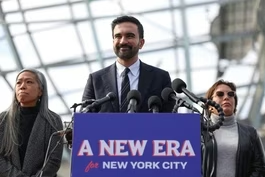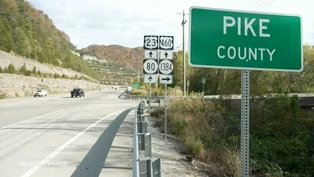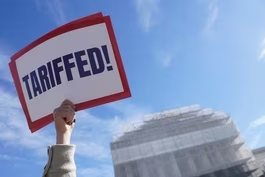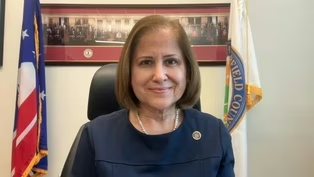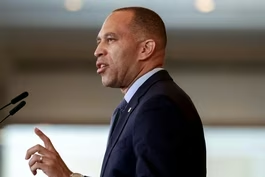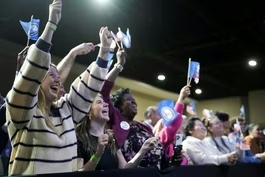
Democratic, GOP strategists on lessons learned from voters
Clip: 11/5/2025 | 7m 27sVideo has Closed Captions
Democratic and GOP strategists on what the parties learned from voters
Democrats dominated election night as economic anxieties and discontent with President Trump’s leadership weighed heavily on Republican candidates. Geoff Bennett discussed the implications with Democratic strategist Ameshia Cross and Republican strategist Whit Ayres.
Problems playing video? | Closed Captioning Feedback
Problems playing video? | Closed Captioning Feedback
Major corporate funding for the PBS News Hour is provided by BDO, BNSF, Consumer Cellular, American Cruise Lines, and Raymond James. Funding for the PBS NewsHour Weekend is provided by...

Democratic, GOP strategists on lessons learned from voters
Clip: 11/5/2025 | 7m 27sVideo has Closed Captions
Democrats dominated election night as economic anxieties and discontent with President Trump’s leadership weighed heavily on Republican candidates. Geoff Bennett discussed the implications with Democratic strategist Ameshia Cross and Republican strategist Whit Ayres.
Problems playing video? | Closed Captioning Feedback
How to Watch PBS News Hour
PBS News Hour is available to stream on pbs.org and the free PBS App, available on iPhone, Apple TV, Android TV, Android smartphones, Amazon Fire TV, Amazon Fire Tablet, Roku, Samsung Smart TV, and Vizio.
Providing Support for PBS.org
Learn Moreabout PBS online sponsorshipGEOFF BENNETT: And joining us now for more political analysis are two political strategists.
That's Democrat Ameshia Cross and Republican Whit Ayres.
It's great to see you both.
So, Ameshia, we will start with you.
Democrats claiming those decisive wins in New York City and in the Virginia and New Jersey governor's races, what lessons, if any, can Democrats take away from those victories as they head toward the midterms?
AMESHIA CROSS, Democratic Strategist: Affordability, affordability, affordability, and nailing Trump where it hits the hardest.
I think that the economic downturn as it relates to people's pocketbooks and not being able to go to the grocery store, not being able to feed their families, the SNAP cuts that are coming from the Big Beautiful Bill Act, but, moreover, the government shutdown, where millions of families across this country who are in poverty don't have access to those SNAP food stamp benefits.
You name the cost, it has gone up.
And the families are really hurting.
I think that, for Zohran Mamdani, huge night, but also for Mikie Sherrill.
Also, we saw great wins in Virginia.
We also saw it in a red state.
I have family in Mississippi.
To see a Black statewide senator run and bust up what is a supermajority in Mississippi, which is a highly red state, I think is a very big deal.
So up and down the ballot, I think that Democratic voters showed up, showed out that their voices be heard.
But they also have seen an authoritarian slide of this administration that really brought them out to the polls.
And I think that Democrats have to continue telling that story.
They have to continue leaning in on the cost of goods, services, how people need to and what the government can and should be doing for them.
And that's a path to victory.
GEOFF BENNETT: And, Whit, if you look at the margins of those races, those key races, it was a blowout.
We have some of the data we can put up there right now.
And if you look at the exit polls, it showed that voters were deeply concerned about the economy jobs, the cost of living, as Ameshia was discussing.
President Trump's inability to deliver on the economic turnaround that he promised, how much of a liability for Republicans is that in the months and years to come?
WHIT AYRES, Republican Strategist: There's no question that the economy and the cost of living was a major factor.
And Donald Trump was elected in large part to juice the economy and bring down inflation.
So anything that works opposite that is a problem for Republicans.
They have got a year to figure it out.
Most economists that I talk to seem to think that tariffs increase inflation, rather than lower prices.
And so they're going to have to figure out how to deal with both tariffs and the inflation, which seems to be creeping up.
GEOFF BENNETT: And, Ameshia, there will inevitably be a debate about which model the Democrats should follow heading into 2026.
Is it the pragmatic centrism of a Spanberger and a Sherrill or the populist progressivism of a Mamdani?
How do you see that shaping up?
AMESHIA CROSS: I think it depends on where you're running.
All politics is local.
We know that.
And adapting your message to your audience is always going to be extremely important.
Affordability is the name of the game.
And, at the end of the day, if you're running in New York, if you're running in South Carolina, if you're running in Georgia, if you're running in Massachusetts, people are still going to care about affordability.
There's a way to carry that message without being extremely far left.
There's a way to carry that message and being moderate, right down the middle, center-left.
And I think that we saw in multiple states yesterday that they figured it out based on the populations that they serve.
That could be on the national level as well.
Anybody running for president in 2028, as well as those who are running throughout the midterms next year, they recognize who their constituents are.
They're going to talk to them and meet them where they are.
The best learning lesson I think they came out of last night's races was that you had people who listened to their constituents.
They heard their cries.
They paid attention to what people wanted to see out of their government, and they gave them a message that worked.
They included them in their campaigns.
And they utilized that messaging strategy to get out the vote.
And that's what really mattered.
WHIT AYRES: Geoff, let's keep that New York election in perspective here.
A very talented socialist got about half the vote in one of the most liberal Democratic-dominated cities in the entire country.
This is not a formula you can take on the road in most of America, with possible exception of maybe a San Francisco or a Portland.
GEOFF BENNETT: The two losing candidates in the New Jersey governor's race, the Virginia governor's race, they were so closely aligned with President Trump and refused to distance themselves from his policies.
So to what degree should last night's results be seen as a referendum on Donald Trump and Trumpism?
WHIT AYRES: Well, Amy has already made the point that Donald Trump was a major factor, but it was also a curious strategy on the part of both of these Republican candidates.
Donald Trump lost both states three times.
The best he did was in 2024, when he got 46 percent in both states.
I fail to see how running as a clone of Donald Trump in a state that he lost three times is a path to victory.
And it wasn't for either one of these Republican candidates.
GEOFF BENNETT: Ameshia, the flip side of Mamdani's rise and his win in New York City is that Republicans will be eager to make him the new face of the Democratic Party.
Could that be a risky proposition for Democrats heading into a general election and the midterms?
AMESHIA CROSS: Well, we have watched them try this before.
They tried to make AOC the face of the Democratic Party.
They have tried to make several leaders of New York's the face of Democratic Party.
It is the most populous city in America, the most diverse one and one with an economy larger than most nations.
We have been here, done that, seen this page before out of the Republican Party.
What they have to understand here is that most people in New York could have cared less whether Mamdani was a Democratic socialist or not.
If you ask most of them, they don't know what a Democratic socialist is.
What they cared about was the fact that this man was running on a platform of affordability, making sure their grocery prices were lower, ensuring that they had a childcare affordability, you name it, so that they could reach what we all consider the American dream.
That's a message that can work across the country.
And I think the Republicans need to focus more on opening the government, which is one of the major reasons they also lost the ballot box, in addition to ensuring that the very things that Trump ran on that got him the votes in 2024, which were largely affordability, he can bring to pass.
If he can't, then he's just going to continue to rack up losses and so will his party.
GEOFF BENNETT: Whit, in the time that remains, I want to draw on your vast experience here in Washington and ask you about the shutdown, because in this closed-door meeting today with Senate Republicans, the president said: "The election results prove that the government shutdown has been worse for us than for Democrats and that Republicans are getting killed."
That's according to multiple Republican senators.
This is a complete contradiction of the message that GOP leaders, congressional leaders are trying to put forward.
What's the impact?
WHIT AYRES: I think most of America is disgusted with a Congress that can't pass a budget and keep the government open.
I think they blame Republicans, they blame Democrats, they blame anybody who's involved.
They need to get this government open and get people back to work.
And, otherwise, I think America is going to blame everybody involved and congressional job approval will go into the single digits.
It's not real good right now.
GEOFF BENNETT: Whit Ayres, Ameshia Cross, our thanks to you both.
Good to speak with you.
WHIT AYRES: My pleasure.
Good to see you.
Democrats dominate in first election since Trump's return
Video has Closed Captions
Clip: 11/5/2025 | 6m 9s | Democrats dominate in first election since Trump's return to White House (6m 9s)
In coal country, community works to heal political divisions
Video has Closed Captions
Clip: 11/5/2025 | 9m 31s | In Kentucky's coal country, a community is working to heal political divisions (9m 31s)
News Wrap: Wing caught fire before UPS plane crashed
Video has Closed Captions
Clip: 11/5/2025 | 4m 42s | News Wrap: Wing caught fire and engine fell off UPS plane before crash, investigators say (4m 42s)
Supreme Court questions Trump's authority to impose tariffs
Video has Closed Captions
Clip: 11/5/2025 | 5m 54s | Supreme Court justices question Trump's authority to impose sweeping tariffs (5m 54s)
Trump's harmful policies fueled Democratic wins, says Hashmi
Video has Closed Captions
Clip: 11/5/2025 | 6m 17s | Trump's unpopular, harmful policies fueled Democratic wins, says Virginia's Ghazala Hashmi (6m 17s)
Voters want focus on 'everyday Americans,' Jeffries says
Video has Closed Captions
Clip: 11/5/2025 | 6m 46s | Voters sent Washington a message to put 'everyday Americans first,' Jeffries says (6m 46s)
What the election results signal for next year's midterms
Video has Closed Captions
Clip: 11/5/2025 | 4m 29s | What the election results signal for next year's midterms (4m 29s)
Providing Support for PBS.org
Learn Moreabout PBS online sponsorship
- News and Public Affairs

FRONTLINE is investigative journalism that questions, explains and changes our world.

- News and Public Affairs

Amanpour and Company features conversations with leaders and decision makers.












Support for PBS provided by:
Major corporate funding for the PBS News Hour is provided by BDO, BNSF, Consumer Cellular, American Cruise Lines, and Raymond James. Funding for the PBS NewsHour Weekend is provided by...
